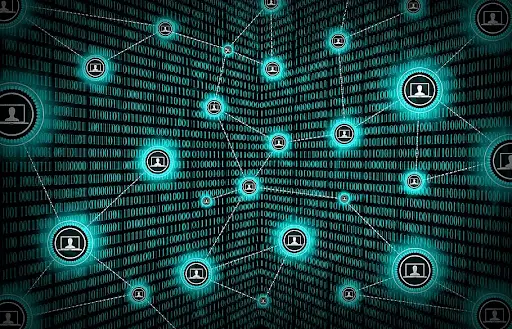Cybersecurity and Blockchain: Are They Related?
Cybersecurity still remains one of the greatest risks to businesses and other related industries. Hackers can ground their operations and sell stolen intellectual property to rivals. Hence, they might also lose market share if competitors get hold of their product secrets.
The pandemic has pushed more companies to fast-track their digital transformation. And with that comes more cyber risks to companies.
Blockchain technology is positioned to help reinforce cybersecurity. The two technologies support each other to protect your business. But how?
Read along to understand more about their relationship and how they protect you.
Table of Contents
What is Cybersecurity?
Cybersecurity is the practice of safeguarding computer systems from cyber attacks. Some of the key features include access control and authentication. The evolving cybersecurity threat landscape undermines new digital transformation trends.
There is an increase of nodes and internet of things (IoT) devices in industrial networks. Security risks related to them expose industrial network systems to more attacks.
On one end, you must deal with security risks posed by your standard IT infrastructure. But, you must also address the risks posed by connecting industrial control systems to the internet. Hence, you must protect your operations technology (OT) and standard IT systems.
The most effective approach is converging the OT and IT systems. You can use the single platform for easy monitoring and risks mitigation.
In short, you should streamline your IT, industrial control, and security systems. OT cybersecurity by Industrial Defender can be handy. It converges your IT and OT. Besides, it provides broad visibility of each network and industrial control asset.
For efficiency, it has vulnerability management and comprehensive compliance reporting. So, it will be an extensive risk management platform for simplified operations.
What is Blockchain?

Source: piqsels.com
Blockchain is a decentralized ledger that tracks and stores transaction records in blocks. The digital ledger stores data transparently because it has an immutability feature. Also, it only grants access to members.
So, the blockchain data can not be modified or accessed by outsiders. It makes it a perfect disruptor in cybersecurity and other sectors.
Some of the key features of blockchain technology:
- Distributed and shared ledger
- Smart contracts
- Transparency and traceability of transactions
How Blockchain Improves Your Cybersecurity
Cybersecurity efforts depend on the CIA triad framework. The CIA model is used to assess an organization’s security posture. The blockchain essentially reinforces the CIA triad model leading to enhanced cybersecurity. Here are the components of the CIA model:
- Confidentiality: It refers to giving access only to authorized parties to appropriate data. Blockchain uses full data encryption. Hence, unauthorized parties can access data in an untrusted network. It uses public-key infrastructure to enable advanced security control and encryption.
- Integrity: Involves protection of unauthorized modification of information. Blockchain’s immutability and traceability can help reinforce data integrity. Adding a consensus model further protects against ledger splitting in a 51% cyber control breach.
Besides, blockchain stores every previous version of data after any iteration. You will therefore be able to have full traceability of each transaction log.
- Availability: DDoS attacks surged past 10 million incidents during the lockdown. As a result, it undermined service availability. There is no single point of failure in blockchain technology. So, the attacker must use small transactions to try and gain access to the network. It is a costly approach that can be discouraging to an attacker.
Blockchain ensures service availability. It removes the chances of IP-linked DDoS attacks that could affect normal operations. Also, its distributed system allows network nodes and assets to be easily restored after an attack. In short, blockchain reinforces system resilience.
Advantages of Using Blockchain in Your Cybersecurity
1. Data Traceability and Transparency
You can easily trace every transaction history in blockchain technology. Besides, each transaction data is signed by the blockchain network members for transparency. Hence, it is easily traceable and visible to concerned parties. Its traceability feature is widely applied to next-generation supply chain solutions.
2. More Secure Data Processing and Storage
Blockchain technology’s decentralized ledger makes it more secure than centralized systems. Blockchain’s immutability feature upholds your data integrity. Any data changes will be recorded and stored securely.
3. Safe Data Transfers and Migration
Blockchain technology leverages its public key infrastructure (PKI) for data transfer authentication. You can further automate smooth data transfer through smart contracts.
Smart contracts are execution agreements between parties that are done automatically. They are based on triggers pegged on critical milestones on the agreements.
4. Elimination of Failure Points
Blockchain’s decentralized system removes the failure of points. A single node failure in an industrial network does not spread to the rest. So for cyber breaches like DDoS attacks, your system will be safe given several copies of ledgers.
However, the advantage is strictly for public blockchain networks and not private ones.
Blockchain Use Cases in Cybersecurity
- IoT Security: Digital transformation will increase the Internet of Things (IoT) adoption. And with it, more security risks to industrial control systems and operations. You can use blockchain to secure industrial IoT (IIoT).
- Data Transmission Protection: Blockchain comes in handy during data transfer and migration. It includes on-premise and cloud data transfers. Most cloud verification schemes for data transfers are not reliable. It makes your data susceptible to modifications.
Using a blockchain integrity-based verification approach solves the problem.
- Protection Against DDoS Attacks: Blockchain security can handle DDoS attacks easily, whether traditional DDoS or sophisticated botnets attacks. Using a decentralized DNS can contain and resolve the attacks.
Despite the apparent benefits of blockchain security implementation in the industrial sector, challenges still exist. Nonetheless, advancements in technology may offer timely solutions to drive mainstream adoption.
Take Away
Cybersecurity is a collection of methods aimed at protecting computer systems. The current approaches have inherent weaknesses. As a result, there are increasing cyber-attacks on industries, businesses, and people.
Blockchain technology can solve some of the vulnerabilities and improve cybersecurity. Its key features like a decentralized ledger and immutability can reinforce your security.
Combining the two technologies can streamline your process and reduce costs. It can also drive efficiency for industrial players. You’ll enjoy increased transparency and visibility into your network with fortified security.




